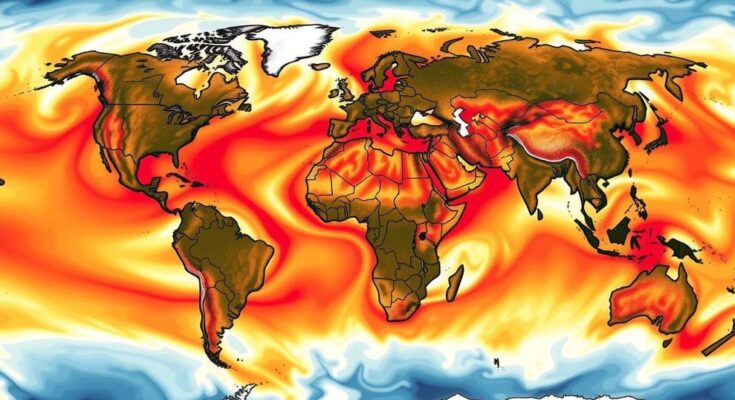The Copernicus Climate Change Service confirmed 2024 as the warmest year on record, with global temperatures exceeding 1.5 degrees Celsius above pre-industrial levels. The average temperature reached 15.1 degrees Celsius, highlighting the urgency for decisive climate action. Record levels of atmospheric water vapor were also noted, contributing to extreme weather events. C3S officials stressed the critical need for immediate action to mitigate these trends.
On January 10, 2024, the Copernicus Climate Change Service (C3S) announced that the year 2024 has been confirmed as the warmest year on record since global temperature measurements began in 1850. This alarming trend emphasizes the critical need for immediate global action to combat climate change. In 2024, the global average temperature reached 15.1 degrees Celsius, surpassing the previous record set in 2023 by 0.12 degrees Celsius and exceeding the significant 1.5 degrees Celsius marker established by the Paris Agreement.
The report highlights that the two-year average temperature for 2023 and 2024 also surpassed the critical threshold, indicating a concerning upward trend. As part of the Paris Agreement, nations aim to limit global warming to well below 2 degrees Celsius and ideally cap it at 1.5 degrees Celsius by the century’s end. Although the current conditions do not signify a breach of the Paris Agreement limit, they reveal a disturbing reality: global temperatures have risen to levels unprecedented in modern human history.
In 2024, the atmospheric water vapor also reached record levels, exceeding the 1991-2020 average by approximately 5 percent. This dramatic rise in temperature and moisture content has led to severe heatwaves and intense rainfall events, exacerbating difficulties for numerous populations worldwide. Climate scientist Julien Nicolas attributes these extreme temperatures chiefly to anthropogenic climate change, while also recognizing the influence of natural phenomena, such as the El Niño Southern Oscillation, on temperature fluctuations this year.
Amid these urgent circumstances, C3S Director Carlo Buontempo urged immediate and decisive actions. He stated that “the future is in our hands — swift and decisive action can still alter the trajectory of our future climate.”
The report from the Copernicus Climate Change Service highlights escalating global temperatures and stresses the need for urgent action against climate change. It provides crucial insights into how average global temperatures have consistently exceeded pre-industrial levels, marking significant implications for both natural ecosystems and human societies. As such, the data reinforces the urgency outlined in the Paris Agreement, which aims to regulate global warming to safeguard future generations from dire environmental impacts.
In conclusion, the confirmation that 2024 is the warmest year on record represents a pivotal moment in understanding climate change dynamics. The surpassed thresholds outlined by the Paris Agreement signal a critical urgency for global cooperation and proactive strategies to mitigate further temperature increases. The interplay of anthropogenic factors and natural climate patterns constitutes a complex challenge that necessitates immediate action to ensure a sustainable future.
Original Source: www.socialnews.xyz




